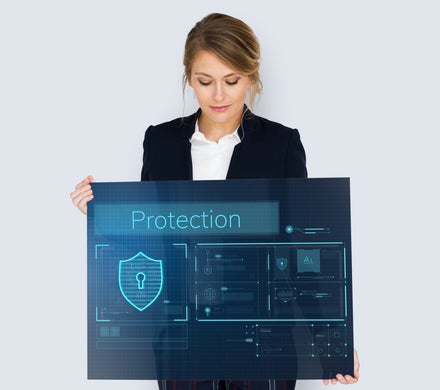Today, we delve into a facet of cybersecurity that may not claim the spotlight but undeniably deserves the attention. Let's explore crucial discussions surrounding safeguarding the rights and privacy of individuals engaged in online sex work, emphasizing the protection of those who advertise or provide services.
What is Cybersecurity?
According to Wiki, computer security or cybersecurity is the vital practice of protecting computer systems, networks, and data from a wide range of digital threats. It involves strategic measures to prevent unauthorized access, data breaches, and disruptions to critical information technology infrastructure.
We usually think of cybersecurity when it comes to protecting big companies and famous data leaks. But its job is just as important for other individuals, including workers in the sex industry.
Just think why internet safety is so important for our rights and privacy online? The internet is now a busy place for different jobs, like advertising or selling different sex work services. Websites have changed how the business works and given more chances for sex workers to meet clients without losing their freedom or to solely interact with them only online.
But, all these online perks also come with a bunch of dangers that can harm our safety and privacy. First let’s look what are the two main aspects of cybersecurity when it comes to sex work:
Protecting Personal Information
One important part of staying safe online for sex workers is making sure our personal information is protected. Sex workers are a limited group that often gets treated unfairly and isn't usually accepted by people. Often, on the internet and in real life, we get treated badly, called names or even much worse. So, it's essential to protect our identity and personal details from bad people on the internet. This can be done by using strong passwords, two-step verification, and tools that secure your information such as VPNs, firewalls and malware software.
Keeping our identity hidden is very important. We often use fake names or and present different identities to keep our real identities private and secure. Use apps that code your messages and fake networks (VPNs) to stay safe. It's also key not to tell clients your personal facts.
Ensuring Financial Security
Many sex workers today use internet platforms to get money from customers. So, it is very important to make sure that money deals are safe. Scammers can use different ways to take money from workers in the sex trade. These methods include trying to trick them by pretending to be someone else, stealing their real identities, and fake uses of credit cards. When money transactions are not possible via verified platforms (OnlyFans), we need to find other secure ways to protect money transactions, like PayPal. And of course let's not forget - cryptocurrencies. This one is my favourite right now. Anonyms, fast, efficient and also digital.

Cyber Threats
Revenge Porn and Exploitation
Cybersecurity comes as a layer of protection for workers in the sex industry who have continued to face severe repercussions from revenge porn. While it tends to be harder to trace the culprit behind this malicious act, these cybercrimes have serious implications on the mental health and livelihood of the victims.
When we talk about ways to fight revenge porn, watermarking has shown to be important. This method is used to put a digital signature into pictures or videos. The signature stays safe even if the pictures or videos are shared many times. Sex workers can use watermarking to find out where the original source is of leaked or shared content.
Also, image recognition programs can help keep cybersecurity strong in the adult industry. It helps find clear bad stuff on different machines, allowing quick moves to take it down. Even though this computer program can be hard to use, it can be very helpful in stopping the spread of naked pictures or videos without permission.
"Deepfake" Technology
Another big cyber danger is the increase and common use of "deepfake" technology. This technology, which is run by artificial intelligence, makes very believable and real pictures or videos. If bad people get control, they can use it to make bad sexual stuff with those who don't know. This can cause serious mental and good name problems that can't be fixed quickly.
Doxing: Private Information Exposure
The adult entertainment industry faces a crucial cybersecurity issue known as doxing - the disclosure of confidential personal information. This harmful practice poses serious risks for both performers and patrons, such as harassment, discrimination, and damage to their reputation. To combat this threat, it is crucial to educate individuals in the industry about digital competency and equip them with advanced security measures.
Cyberstalking and Online Blackmailing
As the adult entertainment industry grows, so do the troubling issues of online blackmailing and cyberstalking. These malicious individuals exploit private and intimate material for their own gain, causing harm and distress to their victims. Particularly concerning is the rise of cyberstalking, which involves intimidating or harassing others on digital platforms, often targeting vulnerable sex workers. These predators prey on vulnerabilities, leaving a lasting impact on the victims' physical and emotional well-being. "Sextortion" is just one example of their tactics, as they may hack into personal files or manipulate individuals into sharing intimate content.
After obtaining these materials, they proceed to intimidate the person by threatening to release them publicly if their demands are not met. These demands usually involve money or more explicit content. This heinous crime not only causes great distress to the victim, but it can also have long-lasting effects on their personal and professional well-being.
Cyberstalking can have devastating effects. It often entails relentless pursuit, harassment, or intimidation through digital means, such as spamming social media accounts, hacking into personal information, or sending unwanted messages. The veil of anonymity offered by the internet makes it simpler for these culprits to intrude into the lives of their targets, leading to psychological anguish, terror, and hysteria.
Fraudulent Money Transactions
With most transactions within the online sex industry being digitally operated, payment fraud is another notable concern. Crafty cybercriminals can dupe sex workers into revealing their bank account details or hijack digital transactions to profit at their expense.
To better illustrate, the scammer might prompt a transaction, then cancel it post the provided service yet before the payment is confirmed. This leaves the sex worker at a loss. In some instances, cybercriminals resort to creating duplicate or counterfeit websites, known as phishing sites, to mimic the look and feel of genuine payment platforms. Unsuspecting users are fooled into entering their account details, unknowingly enabling the scammers to gain unauthorized access to their funds.

Building Cybersecurity Awareness
Did you know that you hold a vital role in cybersecurity? By consistently utilizing secure connections, only sharing personal information when necessary, regularly changing passwords, and with a bit of common sense, you can effectively ward off phishing attempts. It's important to remember that the more knowledgeable we are, the safer our cyber world becomes.
It's crucial for society to recognize the significance of cybersecurity, the potential dangers involved, and the purposeful actions we can all take to protect those who are vulnerable - including sex workers. Initiatives to educate and promote awareness about the importance of cybersecurity and its role in keeping sex workers safe online can help cultivate a society that is knowledgeable and watchful. Here are some general security measures that everyone should take:
Acquire Information and Training
We can be better equipped to defend against cyber threats with the help of professional or volunteer-led cybersecurity training programs. By learning how to recognize warning signs in email phishing scams, the significance of keeping our devices up-to-date, and the advantages of virtual private networks (VPNs), we can effectively protect our online presence.
Use Cybersecurity Tools
Grab some cybersecurity tools that are like superheroes for your digital life. Dodge malware and phishing attacks with internet security packages that are like having a personal bodyguard for your computer. Get to know with VPN - your invisibility cloak in the online world which will make sure to keep your network private.
Use two-factor authentication (2FA) and password managers to create Fort Knox-level passwords for all your accounts among different social platforms.
Do Regular Security Audits
By conducting regular security audits, one can uncover potential vulnerabilities in their digital practices and the platforms they utilize. These audits can be carried out by professionals or by ourselves using various online tools for self-auditing. It is alarming to note that approximately 20% of adult content consumers have been victims of cybercrime, majority of then not even knowing.
Conclusion
To wrap up, it is imperative to prioritize cybersecurity in order to safeguard the rights and privacy of sex workers who operate or promote their services online. By fortifying our personal information, deterring online harassment, guaranteeing financial stability, and combating revenge porn and exploitation, sex workers can confidently work and assert their independence on the internet.
Oh, I almost forgot. Is it cybersecurity or cyber security? Well, both are right.
How and why? Read this interesting article I found on Cybertalk.
Disclaimer: This blog is for informational and personal reflection purposes only. It does not promote, endorse, or facilitate any illegal activities. The content is based on personal experiences and industry insights and should not be interpreted as advice or encouragement to engage in any profession or service that may be restricted or regulated by law. Readers are responsible for understanding and complying with the laws in their jurisdiction.